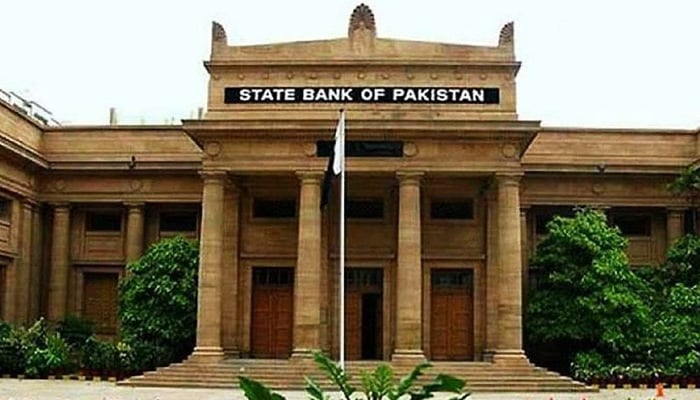SBP reduces policy rate by 1.5% ahead of budget
The decision to cut the key rate to 20.5% comes two days ahead of the budget announcement
KARACHI: The State Bank of Pakistan (SBP) on Monday announced to cut the policy rate by 150 basis points, marking its first rate reduction in nearly four years.
The decision to cut the key rate to 20.5% comes two days ahead of budget and a week after data showed inflation slowed to a 30-month low of 11.8% in May.
However the Monetary Policy Committee (MPC) foresees a risk of inflation to rise significantly in July 2024 from current levels, before trending down gradually during FY25.
The MPC in its statement noted that while the significant decline in inflation since February was broadly in line with expectations, the May outturn was better than anticipated earlier.
The Committee assessed that underlying inflationary pressures are also subsiding amidst a tight monetary policy stance, supported by fiscal consolidation.
At the same time, the MPC viewed some upside risks to the near-term inflation outlook associated with the upcoming budgetary measures and uncertainty regarding future energy price adjustments.
Notwithstanding these risks and today’s decision, the Committee noted that the cumulative impact of the earlier monetary tightening is expected to keep inflationary pressures in check.
As per a survey conducted by Topline Research, 43% of participants expected the policy rate to decline by 100bps.
Similarly, in a poll conducted by CFA Society Pakistan, 48% expected the policy rate to decrease by up to 100bps.
According to a Bloomberg survey, 63% of the participants expected a 100bps decline in the key rate.
Also, for the first time in the last four years (Since Jun 25, 2020), SBP has decided to onset monetary easing.
The central bank last changed rates in an emergency meeting in late June last year, when it raised rates by 100 basis points to a record high of 22%.
Talking to Geo News, Khaqan Najeeb, one of the country's top economists, said: "If you look at the interest rate in Pakistan, which was 22%, you would realise that the real interest rate has become 10% positive."
"The inflation figure of 11.8% showed that the inflation had reduced to a very low level. There [has been]a very big room created in Pakistan to adjust our interest rate.”
"We should see in the upcoming monetary policies that not only the core inflation but also the CPI (Consumer Price Index) headline inflation, and food inflation are trending downward."
Najeeb said that Pakistan’s economy was clogged right now with a growth rate near 2.2%, solely coming from the agriculture sector.
“All in all we moved in the right direction and since the inflation is trending downward and food prices are also going down in the wake of wheat and rice crops, so the inflation should remain in the same vicinity and should be easing in the next June as well,” Najeeb said.
According to the MPC statement, first, real GDP growth remained moderate at 2.4 % in FY24 as per provisional data, with subdued recovery in industry and services partially offsetting the strong growth in agriculture.
Second, a reduction in the current account deficit has helped improve the foreign exchange reserves to around US$9 billion despite large debt repayments and weak official inflows, it added.
The statement adds that the government has also approached the IMF for an Extended Fund Facility program, which is likely to unlock financial inflows that will help in further build-up of foreign exchange buffers.
Lastly, international oil prices have declined, whereas non-oil commodity prices have continued to inch up, it said.
Based on these developments, the Committee, on balance, viewed that it was now an appropriate time to reduce the policy rate.
The Committee noted that the real interest rate remains significantly positive, which is important to continue guiding inflation to the medium-term target of 5–7%.
Economic activity slowed over the last two years in Pakistan as it implemented tough reforms under an International Monetary Fund (IMF) bailout in a bid to stabilise its crashing economy.
Finance Minister Muhammad Aurangzeb, speaking at a business conference in China last week, said he expected rates to come down in the face of falling inflation.
-
Bitcoin crashes below $63K as regulatory pressure and market fears grow
-
Bitwise Crypto Industry innovators ETF: What investors should do in 2026?
-
Nintendo shares slide again as momentum fears grow
-
Gold, silver prices fallen sharply; What’s driving the drop?
-
Gold’s record climb: Experts question if its safety is ‘overstated’
-
Dubai unveils plans to construct street built with real gold
-
Netflix slams Paramount’s bid: 'Doesn't pass sniff test’ as Warner battle escalates
-
Ubisoft: Shares plunge amid restructuring plan and wave of games cancellations












